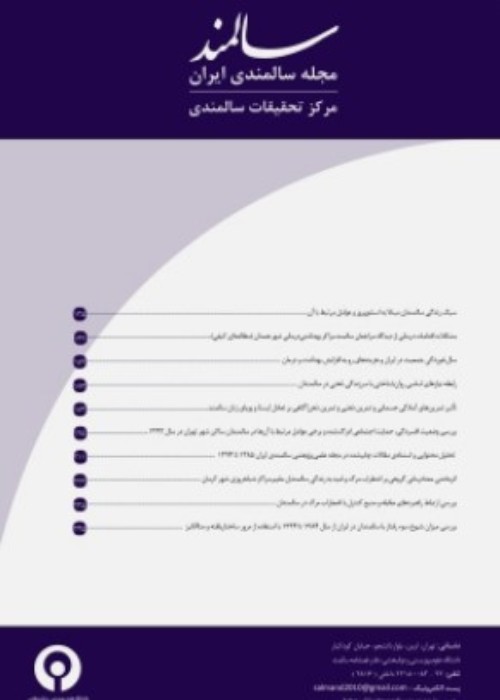The Relationship Between Self-Efficacy and Quality of Life Among Elderly People
Author(s):
Abstract:
Objectives Self-Efficacy is an important variable in the field of elderly, to which little attention has been paid. Quality of Life (QoL) is also one of the most important factors of human development. This study aimed to determine and investigate the relationship between self-efficacy and QoL among elders residing in Tehran nursing homes in 2015.
Methods & Materials In this cross-sectional descriptive-analytic study, the statistical population comprised the residents of nursing homes, especially catering to the elderly, in Tehran. The sample size was 210 individuals, who were selected based on the research criteria. For the elderly people residing in elderly care centers, quota random sampling was performed, and random sampling in each nursing home was made proportionate to the number of elderly residents therein. General self-efficacy scale (GSE-10), elderly quality of life questionnaire (LIPAD), and demographic questionnaire were utilized to collect data. The tools were investigated in terms of reliability. The elderly residents average (SD) age was 78.66 (11.78) years. After sampling and gathering the questionnaires, the collected data were entered into SPSS Version18, and analyzed with descriptive indexes and analytic tests, including frequency, mean, standard deviation, Chi-square test, KolmogorovSmirnov test, ANOVA, and independent t test.
Results The findings showed that the mean (SD) score of self-efficacy among the elder residents of Tehran nursing homes was 17.68 (4.00), and the mean (SD) score of QoL was 27.88 (9.80). There is no significant correlation between self-efficacy and demographic characteristics such as age, sex, or marital status, but there was a significant correlation between the education level (P=0.042) and self-efficacy. There also happened to be a significant correlation between QoL, and age (P=0.047) and education level (P=0.038). Again, there was no significant correlation between QoL, and sex and marital status. In this particular research, the confidence level was considered as 95%.
Conclusion According to the results of the study, self-efficacy of residential elderlies and their quality of life was low. Increase in self-efficacy among the elderly residents of the nursing homes led to a rise in their QoL.
Methods & Materials In this cross-sectional descriptive-analytic study, the statistical population comprised the residents of nursing homes, especially catering to the elderly, in Tehran. The sample size was 210 individuals, who were selected based on the research criteria. For the elderly people residing in elderly care centers, quota random sampling was performed, and random sampling in each nursing home was made proportionate to the number of elderly residents therein. General self-efficacy scale (GSE-10), elderly quality of life questionnaire (LIPAD), and demographic questionnaire were utilized to collect data. The tools were investigated in terms of reliability. The elderly residents average (SD) age was 78.66 (11.78) years. After sampling and gathering the questionnaires, the collected data were entered into SPSS Version18, and analyzed with descriptive indexes and analytic tests, including frequency, mean, standard deviation, Chi-square test, KolmogorovSmirnov test, ANOVA, and independent t test.
Results The findings showed that the mean (SD) score of self-efficacy among the elder residents of Tehran nursing homes was 17.68 (4.00), and the mean (SD) score of QoL was 27.88 (9.80). There is no significant correlation between self-efficacy and demographic characteristics such as age, sex, or marital status, but there was a significant correlation between the education level (P=0.042) and self-efficacy. There also happened to be a significant correlation between QoL, and age (P=0.047) and education level (P=0.038). Again, there was no significant correlation between QoL, and sex and marital status. In this particular research, the confidence level was considered as 95%.
Conclusion According to the results of the study, self-efficacy of residential elderlies and their quality of life was low. Increase in self-efficacy among the elderly residents of the nursing homes led to a rise in their QoL.
Keywords:
Language:
Persian
Published:
Iranian Journal of Ageing, Volume:11 Issue: 43, 2017
Pages:
518 to 527
magiran.com/p1674159
دانلود و مطالعه متن این مقاله با یکی از روشهای زیر امکان پذیر است:
اشتراک شخصی
با عضویت و پرداخت آنلاین حق اشتراک یکساله به مبلغ 1,390,000ريال میتوانید 70 عنوان مطلب دانلود کنید!
اشتراک سازمانی
به کتابخانه دانشگاه یا محل کار خود پیشنهاد کنید تا اشتراک سازمانی این پایگاه را برای دسترسی نامحدود همه کاربران به متن مطالب تهیه نمایند!
توجه!
- حق عضویت دریافتی صرف حمایت از نشریات عضو و نگهداری، تکمیل و توسعه مگیران میشود.
- پرداخت حق اشتراک و دانلود مقالات اجازه بازنشر آن در سایر رسانههای چاپی و دیجیتال را به کاربر نمیدهد.
دسترسی سراسری کاربران دانشگاه پیام نور!
اعضای هیئت علمی و دانشجویان دانشگاه پیام نور در سراسر کشور، در صورت ثبت نام با ایمیل دانشگاهی، تا پایان فروردین ماه 1403 به مقالات سایت دسترسی خواهند داشت!
In order to view content subscription is required
Personal subscription
Subscribe magiran.com for 70 € euros via PayPal and download 70 articles during a year.
Organization subscription
Please contact us to subscribe your university or library for unlimited access!



